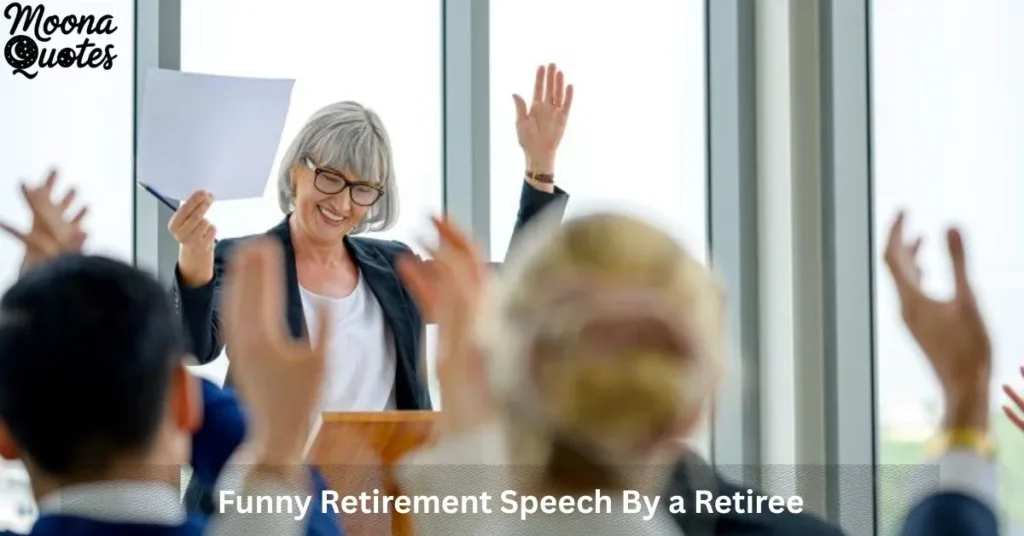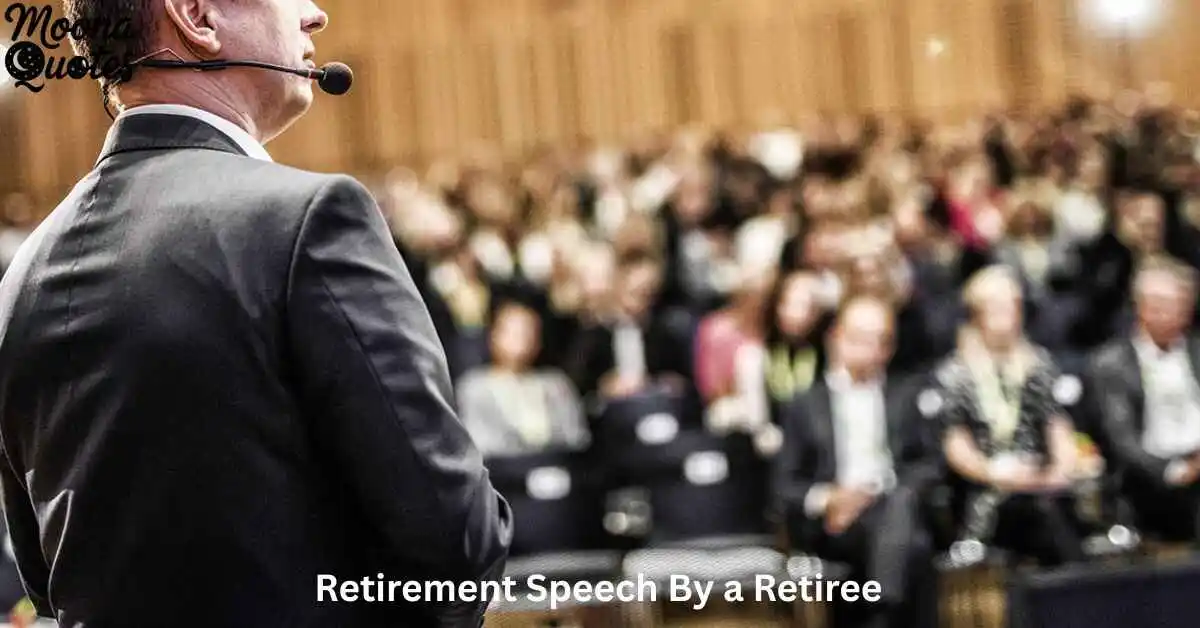Retirement is a big milestone in life. It marks the end of a career and the start of a new chapter. Giving a speech as a retiree is a special moment. It lets you reflect on your journey and thank those who supported you.
But knowing what to say can be tough. You want your words to be meaningful, heartfelt, and memorable. This article provides three examples of retirement speeches for retirees. Each example offers a different approach to expressing gratitude and sharing experiences.
Whether you want a formal, humorous, or emotional speech, you’ll find inspiration here. Use these samples to craft your own heartfelt farewell message.
How To Write / Give A Memorable Retirement Speech
A retirement speech should be heartfelt and memorable. It reflects on your career journey. Here’s how to craft a meaningful farewell message.
- “Start with a warm and heartfelt opening to engage listeners.”
- “Express gratitude to colleagues, mentors, and loved ones for support.”
- “Share memorable moments from your career journey and work experiences.”
- “Reflect on challenges overcome and lessons learned throughout a career.”
- “Use humor to lighten the mood and entertain the audience.”
- “Keep your speech concise and avoid unnecessary long-winded explanations.”
- “Acknowledge teamwork and contributions of coworkers in professional growth.”
- “Include personal stories that highlight key achievements and milestones.”
- “Speak from the heart and maintain an authentic, sincere tone.”
- “Inspire others by sharing future plans and retirement goals.”
- “Thank your family for their support throughout your career.”
- “Mention key mentors who guided you along your professional path.”
- “End on a positive and uplifting note for closure.”
- “Use simple, clear language to make your message easily understood.”
- “Avoid negative remarks and focus on gratitude and celebration.”
- “Maintain eye contact to connect with your audience effectively.”
- “Practice beforehand to ensure smooth and confident speech delivery.”
- “Use a relaxed posture and natural gestures for better engagement.”
- “Pause for emphasis to allow important points to resonate.”
- “Conclude with a heartfelt farewell and words of encouragement.”
Understand the Purpose of the Speech
Your speech should express gratitude and appreciation. It should also inspire and entertain. Understanding its purpose helps set the right tone.
- “Clarify the message you want to convey to the audience.”
- “Express appreciation for the time spent with colleagues and friends.”
- “Share personal insights and meaningful experiences from your career.”
- “Acknowledge the contributions of those who supported your journey.”
- “Reflect on growth, challenges, and lessons learned over time.”
- “Provide encouragement and inspiration for the next generation of employees.”
- “Celebrate accomplishments and milestones that shaped your professional journey.”
- “Mention important projects and collaborations that made a difference.”
- “Keep the speech uplifting, positive, and filled with gratitude.”
- “Ensure the message aligns with your personality and experiences.”
- “Balance humor and sincerity to create an engaging speech.”
- “Encourage continued success for the company and former coworkers.”
- “Avoid dwelling on negative aspects or regrets from your career.”
- “Show appreciation for the support of your family and friends.”
- “Highlight the importance of teamwork and workplace camaraderie.”
- “Provide wisdom and advice for those still working.”
- “End with optimism about the future and new adventures.”
- “Incorporate a short, meaningful quote about retirement or life.”
- “Thank your audience for listening and being part of your journey.”
- “Finish with a heartfelt farewell and a warm smile.”
Plan Your Speech

A well-structured speech keeps the audience engaged. Outline key points beforehand. Planning ensures a smooth and meaningful delivery.
- “Outline key points to keep your speech structured and organized.”
- “Decide on the main message you want to share.”
- “Write an engaging introduction that captures the audience’s attention.”
- “Include personal stories that add depth and authenticity to speech.”
- “Balance humor, gratitude, and inspiration for an engaging speech.”
- “Use simple, clear language to ensure everyone understands your message.”
- “Keep your speech concise to maintain audience interest and engagement.”
- “Mention colleagues and mentors who impacted your career positively.”
- “Prepare transitions between topics for a smooth speech flow.”
- “Decide on a meaningful closing that leaves a lasting impression.”
- “Avoid overloading speech with excessive details or long explanations.”
- “Practice several times to refine the wording and delivery style.”
- “Time your speech to ensure it remains within reasonable length.”
- “Use index cards or notes to stay on track.”
- “Incorporate a memorable quote related to retirement or life.”
- “Consider adding light humor to keep the speech entertaining.”
- “End with gratitude and well wishes for colleagues and friends.”
- “Adjust speech tone based on audience and event setting.”
- “Rehearse in front of friends for constructive feedback and improvement.”
- “Stay confident and enjoy delivering your heartfelt farewell message.”
Related Blog: How To Tell Someone They Smell (Without Offending Them)
Add Personal Touches
Personal stories make speeches more relatable. Share memorable moments with colleagues. Adding warmth and humor enhances emotional connection.
- “Include real-life stories to make your speech more relatable.”
- “Share a heartfelt memory from your early career days.”
- “Mention a mentor who made a significant impact on you.”
- “Talk about a funny or inspiring workplace experience.”
- “Express gratitude to your colleagues for their support and friendship.”
- “Personalize your speech by mentioning specific names and contributions.”
- “Use humor to bring warmth and joy to your message.”
- “Incorporate a favorite saying or meaningful quote in speech.”
- “Reflect on lessons learned and how they shaped your career.”
- “Describe a defining moment that changed your professional path.”
- “Acknowledge the teamwork that led to memorable accomplishments.”
- “Thank your family for their patience and unwavering support.”
- “Highlight the best parts of your journey in the company.”
- “Mention how work friendships enriched your life and career.”
- “Include an inside joke or shared experience with colleagues.”
- “Talk about what you will miss most after retirement.”
- “Express excitement about your next chapter and future adventures.”
- “Use a warm and conversational tone to engage your audience.”
- “Keep it authentic and let your true personality shine through.”
- “End with a heartfelt thank you and sincere farewell.”
Practice Delivery
Rehearsing helps improve confidence and clarity. Practice in front of friends. Focus on tone, pace, and body language.
- “Rehearse your speech multiple times to build confidence and fluency.”
- “Practice in front of a mirror to observe facial expressions.”
- “Record yourself speaking and review for improvement areas.”
- “Read your speech out loud to check clarity and pacing.”
- “Time your speech to ensure it’s within the expected duration.”
- “Practice speaking slowly to avoid rushing through important points.”
- “Use natural pauses to emphasize key moments in your speech.”
- “Maintain good posture and relaxed body language for confidence.”
- “Focus on making eye contact with your audience while speaking.”
- “Practice hand gestures to enhance storytelling and engagement.”
- “Adjust tone and volume for a clear and impactful delivery.”
- “Ask a friend to provide feedback on speech performance.”
- “Work on eliminating filler words like ‘um’ or ‘uh’.”
- “Ensure transitions between ideas feel smooth and natural.”
- “Test using notes or cue cards without reading too much.”
- “Simulate real speech conditions by practicing in a similar setting.”
- “Rehearse answering potential questions after your speech ends.”
- “Repeat practice until you feel comfortable and self-assured.”
- “Visualize a successful delivery to boost confidence before speaking.”
- “Smile, relax, and enjoy the moment while delivering your speech.”
Overcome Nervousness

Feeling nervous is natural before speaking. Deep breaths can help. Visualizing success boosts confidence and ease.
- “Take deep breaths to calm your nerves before speaking.”
- “Remind yourself that the audience supports and appreciates you.”
- “Focus on sharing your story instead of impressing the audience.”
- “Practice regularly to build confidence and reduce anxiety.”
- “Visualize a successful speech to create a positive mindset.”
- “Use positive affirmations to boost self-confidence before speaking.”
- “Start with a strong opening to feel more comfortable.”
- “Pause and gather thoughts if you feel overwhelmed on stage.”
- “Maintain eye contact to create a connection with the audience.”
- “Keep a glass of water nearby for moments of dryness.”
- “Use small hand gestures to keep yourself engaged while speaking.”
- “Rehearse in front of a supportive friend for encouragement.”
- “Wear comfortable clothing to help you feel more at ease.”
- “Move naturally instead of standing stiffly to reduce nervousness.”
- “Focus on one friendly face to ease stage fright.”
- “Arrive early to familiarize yourself with the speaking environment.”
- “Keep your hands relaxed to avoid fidgeting from nervousness.”
- “Smile and remind yourself that mistakes are completely normal.”
- “Use a conversational tone to feel more relaxed while speaking.”
- “Accept nervousness as part of the experience and enjoy the moment.”
Inspirational Retirement Speech By a Retiree
An inspiring speech leaves a lasting impression. It highlights achievements and lessons. Express gratitude and encourage future generations.
- “Begin with a heartfelt thank you to everyone present today.”
- “Reflect on your career journey and lessons learned over time.”
- “Share how challenges shaped you into a better professional.”
- “Acknowledge mentors who guided and supported you throughout your career.”
- “Express gratitude to colleagues for their friendship and teamwork.”
- “Highlight proud moments that made your job meaningful and rewarding.”
- “Encourage others to pursue their dreams with passion and dedication.”
- “Mention the importance of hard work, perseverance, and integrity.”
- “Share a memorable story that left a lasting impact.”
- “Talk about the changes you witnessed in your field.”
- “Offer advice to younger professionals starting their careers.”
- “Emphasize the importance of lifelong learning and self-improvement.”
- “Show appreciation for the company and leadership’s support.”
- “Express excitement for the next chapter of your life.”
- “Share your retirement goals and future aspirations.”
- “Inspire others to embrace challenges with optimism and courage.”
- “Use an inspiring quote about growth, change, or retirement.”
- “End on a positive, uplifting note to leave a strong impact.”
- “Thank the audience once again for being part of your journey.”
- “Close with a heartfelt farewell and warm wishes for everyone.”
Short Retirement Speech By a Retiree
A brief speech can still be impactful. Keep it concise and heartfelt. Focus on appreciation and key memories.
- “Start by thanking everyone for attending this special occasion.”
- “Express gratitude for years of learning and professional growth.”
- “Mention a few memorable moments from your career journey.”
- “Acknowledge colleagues, mentors, and friends for their support.”
- “Share a quick story that highlights a valuable lesson.”
- “Reflect on how much the workplace has changed over time.”
- “Express excitement about the new phase of retirement.”
- “Mention future plans or hobbies you look forward to.”
- “Offer a short piece of advice to younger colleagues.”
- “Use a brief, meaningful quote about life and change.”
- “Keep the speech lighthearted and positive for everyone listening.”
- “Avoid making it too emotional or overly sentimental.”
- “Express appreciation for the company and leadership team.”
- “Mention something you will miss most about work.”
- “Keep it concise and avoid unnecessary long stories.”
- “Thank your family for supporting you throughout your career.”
- “Encourage colleagues to continue striving for excellence.”
- “Maintain a cheerful tone to leave a happy memory.”
- “Close with a sincere goodbye and best wishes for everyone.”
- “End with a warm smile and a final thank you.”
Funny Retirement Speech By a Retiree

Adding humor makes a speech more enjoyable. Lighthearted jokes ease tension. Share funny work moments to entertain.
- “Start with a joke about finally escaping endless emails and meetings.”
- “Mention how retirement means unlimited coffee breaks and no deadlines.”
- “Share a funny workplace story that colleagues will remember forever.”
- “Joke about finally winning the battle against alarm clocks.”
- “Talk about coworkers who made work both fun and challenging.”
- “Say how you’ll miss work but not the morning traffic.”
- “Mention how retirement feels like the longest coffee break ever.”
- “Thank your boss for not firing you too many times.”
- “Joke about leaving coworkers to handle all the hard work.”
- “Talk about office habits you won’t miss at all.”
- “Make light-hearted fun of your own work quirks.”
- “Mention a funny work-related misunderstanding or incident.”
- “Say how retirement means becoming a full-time nap expert.”
- “Thank everyone while pretending to forget someone important.”
- “Joke about how long it took to reach retirement.”
- “Make a humorous comparison between work and retirement life.”
- “Mention how you’ll spend retirement doing absolutely nothing productive.”
- “Say you’ll miss coworkers but not the company memos.”
- “Close with a funny farewell and best wishes for all.”
- “End with a laugh and one last retirement joke.”
Key Takeaways: How To Write / Give a Retirement Speech For Yourself as a Retiree
A great retirement speech is personal and sincere. Express gratitude and reflect positively. End on a hopeful and uplifting note.
- “Keep your speech personal, heartfelt, and filled with gratitude.”
- “Balance humor, inspiration, and sincerity in your speech delivery.”
- “Practice beforehand to ensure smooth and confident delivery.”
- “Include personal stories to make your speech more relatable.”
- “Thank colleagues, mentors, and family for their support.”
- “Share lessons learned throughout your professional journey.”
- “Express excitement for the next chapter of your life.”
- “Use a structured outline to keep your speech organized.”
- “Avoid making your speech too long or overly detailed.”
- “Incorporate humor to make the speech enjoyable and engaging.”
- “Speak naturally and from the heart for authenticity.”
- “End with a positive note and warm farewell.”
- “Encourage younger colleagues to continue striving for success.”
- “Use clear language to ensure your message is well understood.”
- “Incorporate a meaningful quote about life or retirement.”
- “Maintain eye contact to connect with your audience.”
- “Overcome nervousness by practicing and staying confident.”
- “Adjust your speech tone based on the audience.”
- “Avoid negativity and focus on celebration and gratitude.”
- “Enjoy the moment and cherish this special milestone.”
FAQs
What should I include in my retirement speech?
“Express gratitude, share memories, offer advice, and end on a positive note.”
How long should a retirement speech be?
“Keep it between 3 and 5 minutes for the best engagement.”
Should I use humor in my retirement speech?
“Yes, light humor makes the speech more enjoyable and memorable.”
How can I make my speech more personal?
“Include personal stories, experiences, and heartfelt appreciation for colleagues.”
What’s the best way to end a retirement speech?
“With gratitude, a warm farewell, and best wishes for everyone.”
Conclusion
A retirement speech is a special way to reflect on your journey. It allows you to express gratitude and share meaningful experiences. Keeping it heartfelt makes it more memorable. Adding humor can make it enjoyable for everyone.
A well-structured speech leaves a lasting impact. Practice helps in delivering it with confidence. Whether long or short, sincerity matters most. Ending on a positive note is always a great idea. A warm farewell leaves a strong impression.
Thanking colleagues and mentors shows appreciation. Sharing plans adds a personal touch. Encouraging others to chase their dreams is inspiring. A retirement speech is a beautiful final message. It marks the start of an exciting new chapter.

Marco Jansen is a passionate blogger who runs a quotes website, sharing inspirational, motivational, and thought-provoking quotes to uplift and inspire readers worldwide. Explore wisdom and positivity with him

